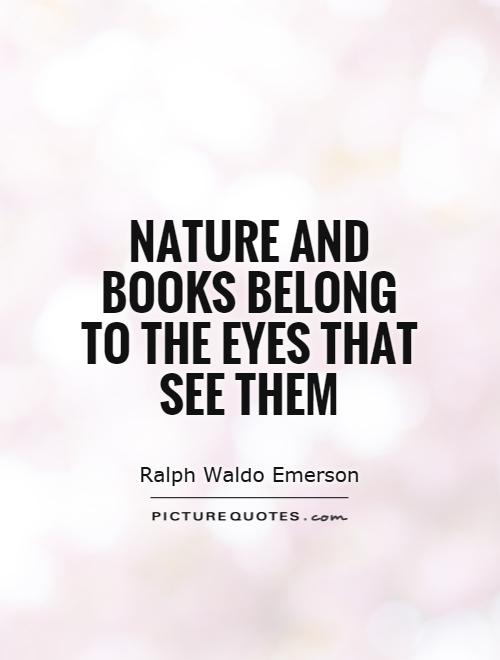Nature and books belong to the eyes that see them

Belonging To Nature QuotesNature Emerson QuotesNature Ralph Waldo Emerson QuotesEyes That See QuotesRalph Waldo Emerson Quotes
Nature and books belong to the eyes that see them
Ralph Waldo Emerson, a renowned American essayist, lecturer, and poet, was a firm believer in the interconnectedness of nature and literature. One of his famous quotes, "Nature and books belong to the eyes that see them," encapsulates his philosophy that both nature and literature hold profound meaning for those who truly appreciate and understand them.Emerson believed that nature and literature are not passive entities that can be easily understood by anyone. Instead, he argued that they require a certain level of insight, perception, and appreciation to truly grasp their beauty and significance. In other words, both nature and books reveal their true essence only to those who have the eyes to see them.
For Emerson, nature was a source of inspiration, wisdom, and spiritual nourishment. He believed that by immersing oneself in the natural world, one could gain a deeper understanding of the universe and one's place in it. Nature, according to Emerson, was a reflection of the divine, and by observing and contemplating its beauty and complexity, one could connect with the higher truths of existence.
Similarly, Emerson saw literature as a means of exploring the human experience and delving into the depths of the human soul. He believed that great works of literature had the power to illuminate the complexities of human nature, provoke thought, and inspire personal growth. However, Emerson also recognized that not everyone could appreciate the true value of literature. Just as with nature, he argued that books belonged to the eyes that could see them – that is, to those who could read between the lines, discern the deeper meanings, and appreciate the beauty of language and storytelling.












 Friendship Quotes
Friendship Quotes Love Quotes
Love Quotes Life Quotes
Life Quotes Funny Quotes
Funny Quotes Motivational Quotes
Motivational Quotes Inspirational Quotes
Inspirational Quotes